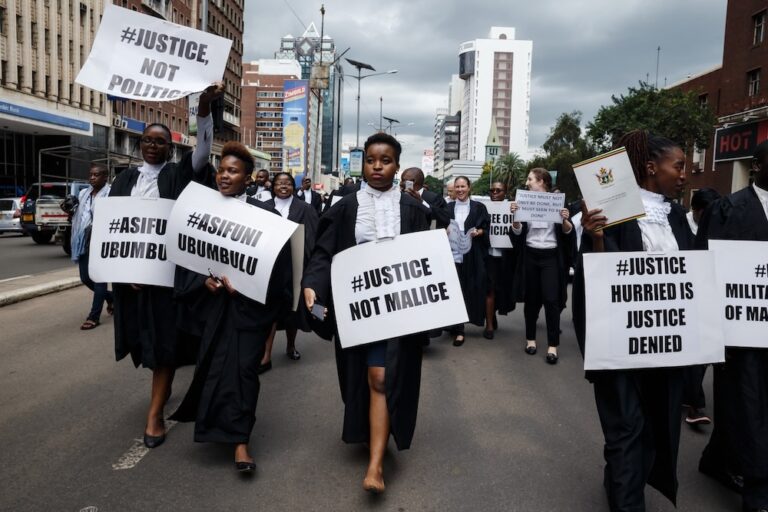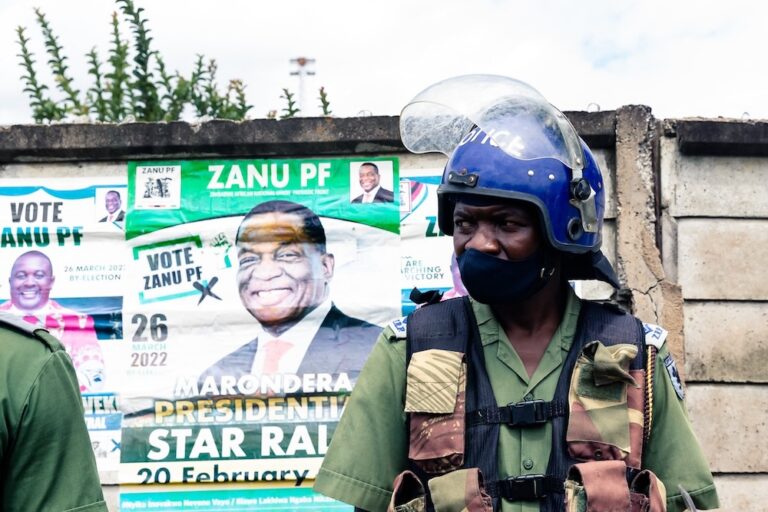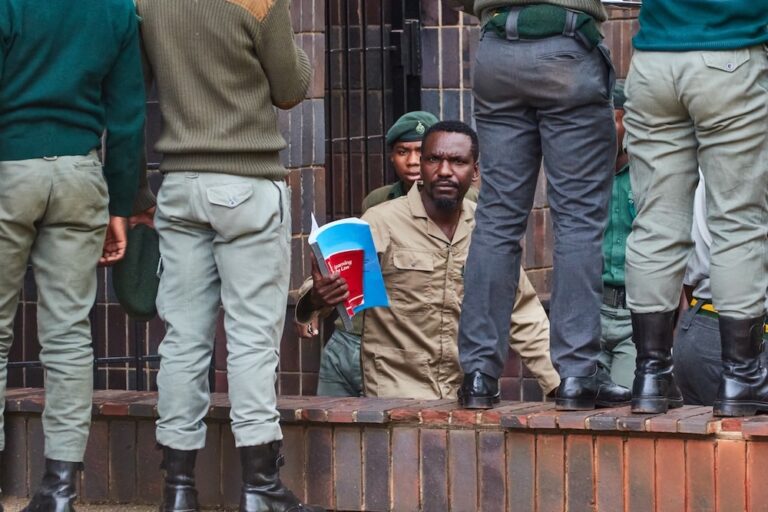(MISA/IFEX) – The Zimbabwe High Court has ordered the Zimbabwe Broadcasting Corporation (ZBC) to start airing the banned programme Talk to the Nation within five days. The ZBC banned the programme in July 2001. Talk to the Nation is sponsored by the National Development Association (NDA). High Court Judge Justice Paradza said the matter was […]
(MISA/IFEX) – The Zimbabwe High Court has ordered the Zimbabwe Broadcasting Corporation (ZBC) to start airing the banned programme Talk to the Nation within five days. The ZBC banned the programme in July 2001. Talk to the Nation is sponsored by the National Development Association (NDA).
High Court Judge Justice Paradza said the matter was simply a contractual dispute, and ruled that the ZBC unlawfully terminated the programme in violation of the contract. “This matter to me is a simple and straightforward contractual dispute. I am satisfied that the ZBC unlawfully terminated the contract, so the NDA is granted relief,” Justice Paradza said in his judgment.
NDA’s programme was banned on 4 June 2001. The ZBC and NDA had signed a contract on 24 March 2001. The judgment specifies that the remainder of NDA’s 26 programmes are to be aired over the next 23 consecutive weeks, starting on Thursday 6 June 2002 at 9:00 p.m. (local time). The ZBC was ordered to make available the personnel, equipment and studio facilities that are necessary for the broadcasting of the programme.
Justice Paradza said the terms used to ban the NDA’s programme were unlawful and the ZBC had failed to substantiate its arguments to the court. Advocate Adam Kara, representing Information and Publicity Minister Jonathan Moyo and the ZBC, said the programme was cancelled on policy grounds and was lawful in terms of the ZBC Commercialisation Act. He further said that the cancellation of the programme had not prejudiced the NDA, which could not claim airtime. Kara also argued that since the programme was a live production, it was extremely difficult to edit, became a “free for all,” and caused unnecessary alarm to some viewers. He further argued that since the ZBC had full editorial control and production of programmes, the corporation was entitled to withdraw the production. Kara had also argued that Moyo be removed as a respondent in the matter, arguing that the minister was not involved in the ZBC’s day-to-day operations.
However, the NDA’s lawyer, Advocate Pearson Nherere, argued that the NDA had not breached the agreement it entered into with the ZBC. He added that the reasons given for the cancellation were unjustifiable in terms of the contract entered into. He further argued that Minister Moyo was behind the banning of the programme and was therefore rightfully cited as a respondent. Nherere also stated that by cancelling the programme, the ZBC was denying members of the public their constitutional right to freedom of expression, since the ZBC is a public institution.
The court heard that Munyaradzi Hwengwere, then the principal press secretary in the Department of Information, had said the decision to ban the programme was not made by the government minister but by the ZBC board, although the government supported the move. Hwengwere is now the ZBC’s chief executive officer.
In a supporting affidavit, NDA Chairperson Mutumwa Mawere said NDA Coordinator Kindness Paradza advised him on 1 June 2001 that Hwengwere had expressed some sentiments over the programme. To further prove that it was Moyo who ordered that the programme be banned, Mawere said he called the minister to find out if there was any problem with the programme, to which Moyo replied that the programme could not continue in its present form.
“I called Moyo, who was then in South Africa, to find out from him whether there was indeed any problem with the show. Moyo confirmed the sentiments expressed by Hwengwere. He essentially stated to me that the programme could not be allowed to continue in its present form,” said Mawere. “Moyo further advised me that his ministry could not allow a situation where the ZBC surrenders ownership of a live programme to a civic organisation or such other outside person,” said Mawere.
Mawere went on to say that he later received a call from then ZBC director general Luke Munyawarara, who said he had spoken to Moyo over the programme and would be further consulting Moyo over the issue. Three days later, Mawere received a letter cancelling the programme on unclear policy grounds.
Background Information
It was generally believed that Moyo was angered by the appearance of Tapiwa Mashakada, an opposition Movement for Democratic Change member of parliament, on the programme, in which he outclassed the ruling party’s member of parliament, David Chapfika, in explaining Zimbabwe’s economic problems and possible solutions.
The judge ruled that Moyo, who facilitated the ban of the programme, must pay part of the legal costs of the trial, together with the ZBC. The ZBC and Moyo have since expressed their intention to appeal the judgment.
On 6 June 2001, ZBC Chairperson Gideon Gono denied that the banning of the live phone in programme Talk to the Nation was based on political grounds.


